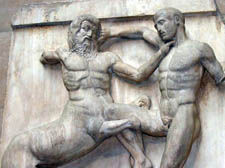|
|
 |
| |
 Metope from the Parthenon marbles depicting a centaur and a lapith fighting Metope from the Parthenon marbles depicting a centaur and a lapith fighting |
Camden books | The Parthenon Marbles: The Case for Restitution. By Christopher Hitchens| review | British Museum | Athens
With the completion of the new Acropolis Museum in Athens, Christopher Price says the British Museum must give back Lord Elgin’s Parthenon ‘loot’ order this book
THIS book is not a new one; but while the text is identical to previous editions, new introductions by Christopher Hitchens and Nadine Gordimer place it firmly in today’s context.
A new Acropolis Museum is about to be completed in Athens, tailor made to unite the Parthenon frieze which is currently split 50-50 between the British Museum in Bloomsbury and Athens. All the previous excuses – that the marbles should stay in London because we are better at looking after archaeological objects than the Greeks – have now collapsed.
More important, the cultural mobility atmosphere has changed beyond measure. Deals are now being done regularly about the return of cultural objects. The new museum in Athens is helping to exert the same sort of pressure to rectify historic cultural colonialism as Harold Macmillan’s “wind of change” speech did, half a century ago, in ending political colonialism.
Powerful museums today can no longer afford to be complacent about their imperial loot.
None of this is the museums’ fault. The Parthenon Marbles were imperial spoils sanctioned by the British parliament and government two centuries ago. But for many years now politicians have begun to feel guilty about the past and have sought to use our cultural spoils diplomatically.
During the Second World War, Winston Churchill favoured returning the Parthenon marbles to Athens as a sort of Victoria Cross for Greek gallantry in fighting the Germans. (An unsentimental Clement Attlee, who chaired cabinet committees during the war, scuppered the idea fast.)
Macmillan toyed with the idea of swapping the marbles for a truce in Cyprus with EOKA, the National Organisation for Cypriot Combatants; and by the 1980s, Labour politicians in opposition went further. Both Michael Foot and Neil Kinnock promised to return the marbles when Labour was back in government. It never happened because, like Attlee, Tony Blair did not do “culture”. Over time he was persuaded to send aboriginal objects back to Australia and signed up to an agreement over Holocaust-looted art. But he balked throughout at the ethical issue of returning stolen objects to their original owners.
So as far as the marbles are concerned, New Labour has used the British Museum trustees as an alibi for inaction. The trustees are worthy, often anonymous business folk, gently sprinkled with a few celebrities, like Bonny Greer and Helena Kennedy. It would be nice if they would initiate a public debate; but even the normally voluble among them button their lips, as if they have signed some Trappist oath to keep silent.
The British Museum is a very public institution with a very private governing body of trustees. So the one individual who has the ability to do something about all this is Neil MacGregor, the museum’s popular and effective director, who has just signed up for another five years in Bloomsbury at a time when many were predicting he would be snapped up by the Met in New York.
His current alibi for doing nothing so far – an insistence that nothing can happen until the Greeks should acknowledge British “ownership” – is a precondition calculated to humiliate the Greeks and maintain the status quo. He just might use his last years to sort out a settlement.
The agenda, however, has now become positive reunification rather than mere restitution. In 1806 Lord Elgin’s agents only managed to saw off around half the frieze from the architectural pieces of the temple on which they had been carved by Pheidias and his assistants two and a half millenia ago. The rest are now in the new Acropolis Museum in Athens, where they will be displayed in a stunning glass gallery lit by the Mediterranean sun alongside the Parthenon.
The millions of tourists who will visit the museum next year will not miss the eloquence of the empty spaces which the British Museum trustees still continue to insist they “own”.
The virtue of Hitchens’ book is the detail with which he lays out the history of the theft and the subsequent arguments – from the debate in parliament about bailing out the (virtually bankrupt) Lord Elgin in the early 19th century down to the former British Museum director, Sir David Wilson, characterising any removal of the marbles to Greece as “cultural fascism”.
Hitchens is adept as getting the prose just right and revealing an unpleasant English mix of aesthetic hubris and imperial realpolitik. The subtext is that since we inherited the intellectual supremacy of Greece it is reasonable that we keep its heritage safe.
In all this, it is only fair that I should declare some interests. I have always felt since clambering over the Parthenon 55 years ago, that the marbles should go back; and I have always admired Hitchens’ taut campaigning talent since we were fellow New Statesman journalists 40 years ago.
Today he is often, wrongly, parodied as a political turncoat; his loyalty to this cause defies that accusation. When the marbles do go back, he will have played a crucial role in their homecoming.
|
 |
|
 |
 |
|
 |
|



